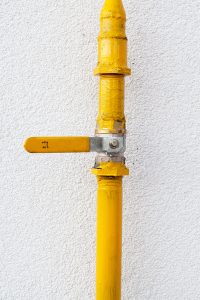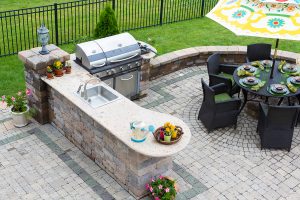Outdoor Gas Safety Tips
Date: May 17, 2017
ARTICLES
OUTDOOR GAS SAFETY TIPS
MAY 17, 2017
If you have an outdoor kitchen, you need to read these outdoor gas safety tips!
Outdoor kitchen and eating areas are becoming more and more common in homes, especially in regions like Phoenix are where we have such great weather most of the year. Where else can you hang out in the backyard during January and February? Families and friends want to be outside enjoying their surroundings, so it only makes sense to have a kitchen outside as well — mealtime is a quintessential time for family to come together. What’s more, no entertainer’s home is complete without an awe-inspiring outdoor space either. But there is a lot more to having an outdoor kitchen than simply building a counter space and sliding in a refrigerator and grill. You need proper framing, proper insulation, the right appliances to withstand the weather and if you are using natural gas, you need to make sure it is run properly and safely. Here are gas safety tips to keep in mind when enjoying outdoors kitchens.
OUTDOOR KITCHENS AND GAS SAFETY
When it comes to the design of your outdoor kitchen everyone wants to jump right into the aesthetics and beauty of what they will be creating. Within this beauty however, needs to be a foundation that is safe.
1. SAFETY FIRST
First, decide on the layout of your kitchen and make sure that the contractor building it has safety in mind first. Beyond where the drink refrigerator will be in relation to the seating area, this layout must include how your gas line will be run and the safety measures associated with the line. Make sure that there is a shut-off valve for the gas line that is easily accessible and reachable. Should something go wrong, everyone in the family needs to know where that valve is and how to operate it. The quickest way to put out a fire is by cutting off its fuel supply.
2. HAVE YOUR LINES INSPECTED REGULARLY
Much like a gas fireplace in your home, or the gas line to your water heater, have the gas line for your outdoor kitchen inspected yearly. Catching faulty fittings or a leaking gas line can prevent major damage and/or injury. We have mentioned this in the past, but yearly preventative maintenance is essential to preventing bigger problems down the road.
3. WHEN BUILDING YOUR OUTDOOR KITCHEN, USE PROPER MATERIALS
Keep in mind the materials being used within the design as well. If wood products are being used for framing and sub-structure, a stainless steel sleeve (also known as a grill jacket) must be used for the grill insert to sit on. This will protect the wood from getting too hot and catching on fire. Another way to frame your outdoor kitchen is by staying away from wood products and using galvanized steel instead. There are even kits from home improvement stores you can get if you want. Simply screw and secure the sections in place, then add brick, rock, stucco or whatever else your design calls for.
4. ENSURE PROPER VENTILATION
Just like your normal patio grill or the oven in your home, your outdoor kitchen needs to have proper ventilation for the gas to escape. Failing to ensure proper ventilation can potentially cause the gas to build up and, ultimately, explosions. Remember that if you are using natural gas that you need to install the vents higher, as natural gas rises. If you decide against natural gas, opting instead for propane, install the vents lower. Propane is heavier and tends to settle, rather than rising.
5. CODES AND PERMITS
Adding an outdoor kitchen is similar to adding an addition or remodeling your home in many cities, especially if it is of a good size. Remember to check building codes where you live and what permits (if they exist) that you will need. This is essential if you have decided to run a natural gas line to your kitchen. The last thing you want to have happen is to get partially done—or heaven forbid all the way done—and have an inspector or city official tell you to tear it all down. Building codes and permits can be frustrating, but they exist to make sure that not only you stay safe, but your neighbors and future owners of the home do as well. In this same vein, be sure to only work with qualified contractors who are reputable, licensed and who will guarantee their work.
6. HIRE A PROFESSIONAL
Adding an outdoor kitchen to your home can create a wonderful entertainment space for family and friends. But remember to keep these safety tips in mind BEFORE you start building or improving your new outdoor kitchen space. And make sure to call us when it is time for your yearly inspection! If you have not done this already, do it today. The weather is prime for outdoor cooking and you will want to make the most of it before it gets too hot outside.


